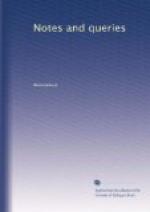“Delighted” (Vol. ii., p. 113.).—I incline to think that the word delighted in Shakspeare represents the Latin participle delectus (from deligere), “select, choice, exquisite, refined.” This sense will suit all the passages cited by MR. HICKSON, and particularly the last. If this be so, the suggested derivations from the adjective light, and from the substantive light, fall to the ground: but MR. HICKSON will have been right in distinguishing Shakspeare’s delighted from the participle of the usual verb to delight, delectare=gratify. The roots of the two are distinct: that of the former being leg-ere “to choose;” of the latter, lac-ere “to tice.”
B.H. KENNEDY.
Meaning of the Word “Delighted."—I am not the only one of your readers who have read with deep interest the important contributions of MR. HICKSON, and who hope for further remarks on Shakspearian difficulties from the same pen. His papers on the Taming of the Shrew were of special value; and although I do not quite agree with all he has said on the subject, there can be no doubt of the great utility of permitting the discussion of questions of the kind in such able hands.
Perhaps you would kindly allow me to say thus much; for the remembrance of the papers just alluded to renders a necessary protest against that gentleman’s observations on the meaning of the word delighted somewhat gentler. I happen to be one of the unfortunates (a circumstance unknown to MR. HICKSON, for the work in which my remarks on the passage are contained is not yet published) who have indulged in what he terms the “cool impertinence” of explaining delighted, in the celebrated passage in Measure for Measure, by “delightful, sweet, pleasant;” and the explanation appears to me to be so obviously correct, that I am surprised beyond measure at the terms he applies to those who have adopted it.
But MR. HICKSON says,—
“I pass by the nonsense
that the greatest master of the English
language did not heed the
distinction between the past and the
present participles, as not
worth second thought.”
I trust I am not trespassing on courtesy when I express a fear that a sentence like this exhibits the writer’s entire want of acquaintance with the grammatical system employed by the great poet and the writers of his age. We must not judge Shakspeare’s grammar by Cobbett or Murray, but by the vernacular language of his own times. It is perfectly well known that Shakspeare constantly uses the passive for the active participle, in the same manner that he uses the present tense for the passive participle, and commits numerous other offences against correct grammar, judging by the modern standard. If MR. HICKSON will read the first folio, he will find that the “greatest master of the English language” uses plural nouns for singular, the plural substantive with the




